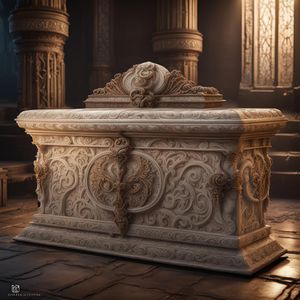Difference between revisions of "Sulaisum Osper Nemni"
Forthright (talk | contribs) (Created page with "right|thumb|Sulaisum Osper Nemni Sulaisum Nemni (373-391-414), born Legesh, known to the Lady as Hojon, was the seventh hengi of the Nemni lineage and t...") |
Forthright (talk | contribs) |
||
| Line 1: | Line 1: | ||
[[File:ancestor.jpeg|right|thumb|Sulaisum Osper Nemni]] | [[File:ancestor.jpeg|right|thumb|Sulaisum Osper Nemni]] | ||
| − | Sulaisum Nemni (373-391-414), born Legesh, known to the Lady as Hojon, was the seventh hengi of the Nemni lineage and the sixth to bear the moniker 'osper'. He succeeded his cousin Ertozo who died in Dezhiri of 414 at the beginning of the second Khutu-Taizian War. Sulaisum was hengi during the final defense of the main fort at Gil Pirtu against the Taizian forces in the winter of 414, until eventually his Hands were killed or captured and the bubun defending the fortress were overwhelmed. Sulaisum recognized the potential that he could be taken captive, and ordered a final press of the Khutuan forces, during which he was slain in Zhuno 414. Sulaisum's body was recovered and unsuccessful efforts to revive him were made at Nemnosti, where he still remains as an ancestor. He was succeeded by his young nephew Igatu, who led the lineage throughout the remainder of the war and for decades thereafter. The year 414 has been known at Nemnosti ever since as the Three-hengi Year. Great statues of Ertozo and Sulaisum stand immediately inside the main gates of the cloister to this day. | + | Sulaisum Nemni (373-391-414), born Legesh, known to the Lady as Hojon, was the seventh hengi of the [[Nemni lineage]] and the sixth to bear the moniker 'osper'. He succeeded his cousin Ertozo who died in Dezhiri of 414 at the beginning of the second [[Khutu-Taizian wars|Khutu-Taizian War]]. Sulaisum was hengi during the final defense of the main fort at [[Gil Pirtu]] against the Taizian forces in the winter of 414, until eventually his Hands were killed or captured and the bubun defending the fortress were overwhelmed. Sulaisum recognized the potential that he could be taken captive, and ordered a final press of the Khutuan forces, during which he was slain in Zhuno 414. Sulaisum's body was recovered and unsuccessful efforts to revive him were made at [[Nemnosti]], where he still remains as an ancestor. He was succeeded by his young nephew Igatu, who led the lineage throughout the remainder of the war and for decades thereafter. The year 414 has been known at Nemnosti ever since as the Three-hengi Year. Great statues of Ertozo and Sulaisum stand immediately inside the main gates of the cloister to this day. |
{{nem}} | {{nem}} | ||
{{nem-npc}} | {{nem-npc}} | ||
Revision as of 19:53, 10 January 2024
Sulaisum Nemni (373-391-414), born Legesh, known to the Lady as Hojon, was the seventh hengi of the Nemni lineage and the sixth to bear the moniker 'osper'. He succeeded his cousin Ertozo who died in Dezhiri of 414 at the beginning of the second Khutu-Taizian War. Sulaisum was hengi during the final defense of the main fort at Gil Pirtu against the Taizian forces in the winter of 414, until eventually his Hands were killed or captured and the bubun defending the fortress were overwhelmed. Sulaisum recognized the potential that he could be taken captive, and ordered a final press of the Khutuan forces, during which he was slain in Zhuno 414. Sulaisum's body was recovered and unsuccessful efforts to revive him were made at Nemnosti, where he still remains as an ancestor. He was succeeded by his young nephew Igatu, who led the lineage throughout the remainder of the war and for decades thereafter. The year 414 has been known at Nemnosti ever since as the Three-hengi Year. Great statues of Ertozo and Sulaisum stand immediately inside the main gates of the cloister to this day.
